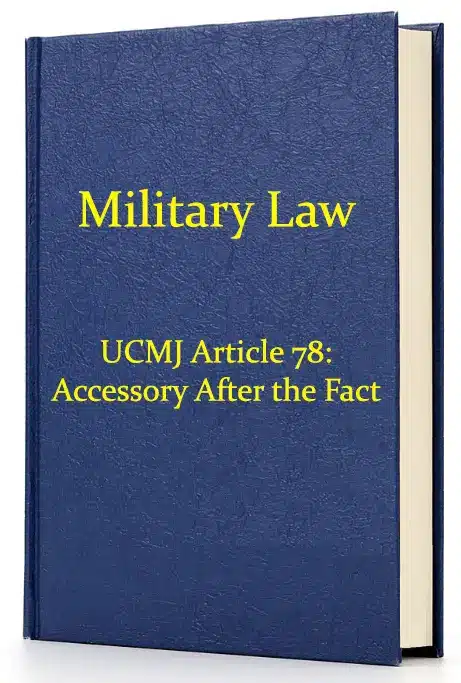Accessory After the Fact
UCMJ Article 78 (Accessory After the Fact) specifies a service member may be subject to prosecution if they:
-
Knowingly receive, comfort, or assist an offender to hinder or prevent apprehension, trial, or punishment. The accessory need not have participated with or helped the principal during the commission of the crime to be punished through the use of Article 78 or
-
Participate in acts used to conceal the commission of the offense itself.
The prosecution must prove beyond a reasonable doubt:
-
That a particular person committed an offense punishable by the UCMJ;
-
The accused knew that this person had committed such offense;
-
After that, the accused received, comforted, or assisted the offender; and
-
The accused did so to hinder or prevent the offender’s apprehension, trial, or punishment.
Understanding Article 78 (Accessory After the Fact) of the UCMJ
The accused must have known about the crime and done something to benefit the offender AFTER the crime was committed. The benefits could range from something as simple as offering the offender a “safe place to stay” to something as complex as assisting the principal in destroying evidence.
Maximum Possible Punishments for Violations of Article 78
For persons convicted of violating Article 78, the maximum possible punishment includes the “maximum punishment authorized for the principal offense, except that in no case shall the death penalty nor more than one-half of the maximum confinement authorized for that offense be adjudged, nor shall the period of confinement exceed ten years in any case, including offenses for which life imprisonment may be adjudged.”
The individual prosecuted under Article 78 is subject to the same punishment as the original offender but is not considered a principal in the crime. One may still be convicted as an “accessory after the fact” even if the principal is acquitted in a separate trial.
How do you defend against Article 78 Accessory After the Fact charges?
When facing the combined resources of the military and the current cultural climate, you need to be prepared to defend your career and your freedom. Crisp and Associates, LLC has a team of experienced trial attorneys who have won these cases. This team includes the firm’s founder, Jonathan Crisp, a highly respected former Army JAG with over 23 years of experience in military law and a sought-after speaker and lecturer on military law. Donald Gordon has litigated cases before the Discharge Review Board, the Board for Correction of Military Records, and the Board for Correction of Naval Records regarding various matters and a diverse background of clients.
If you, or someone you know, is facing Article 78 as a principal of a crime, you need to speak with a Military defense attorney immediately.


